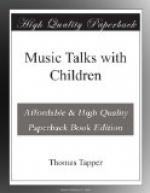All the school studies have a use, to be sure—a direct use—in giving us something to help us in life in one way and another. But besides this, we get another help from study; namely, the employment of the mind in the right way. For the right way of doing things which are worthy of the heart, gives power and good. It is the wrong way of doing things that causes us trouble. Some studies demand exactness above all this,—like the study of Arithmetic—others a good memory,—like History—others tax many faculties, as we have seen in our Talk about School Music.
Some of the studies are particularly valuable to us at once because they make us do. They may be called doing studies. In Arithmetic there is a result, and only one result, to be sought. In Grammar every rule we learn is to be applied in our speech. Manual training demands judgment and the careful use of the hands. Penmanship is a test for the hand, but History is a study touching the memory more than the doing faculty.
School music, you see at once, is a doing study. Not only that, it is full of life, attractive, appealing to the thoughts in many ways, and yet it is a hearty study—by that I mean a study for the heart.
If you have noticed in your piano music the Italian words which are given at the beginning of compositions, you may have thought how expressive most of them are of the heart and of action. They are doing words particularly. Allegro is cheerful; that is its true meaning. It directs us to make the music sound cheerful as we sing it or play it. What for? So that the cheerfulness of the composer shall be for us and for other people. And Vivace is not merely quickly, but vivaciously. Now what does vivacious mean? It means what its root-word vivere means, to live. It is a direction that the music must be full of life; and the true life of happiness and freedom from care is meant. So with Modcrato, a doing word which tells us very particularly how to do; namely, not too fast, spoiling it by haste, nor too slowly, so that it seems to drag, but in a particular way, that is, with moderation.
Music takes its place as a doing study; and as we have already discovered, its doing is of many kinds, all requiring care. Singing or playing is doing; reading the notes is doing; studying out the composer’s meaning is doing; making others feel it is doing; everything is doing; and doing is true living, provided it is unselfish.
Let us see if there is not a simple lesson in all this. To seek it we shall have to say old thoughts over again. Music itself uses the same tones over and over again; it is by doing so that we begin to understand tone a little.




